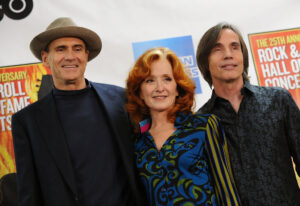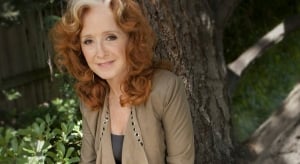
By Scott Benjamin – CBS
As she walks down the street, it’s hard to miss the flaming red hair, even when she’s wearing a hat. It gets Bonnie Raitt recognized all right, sort of.
“I get Reba sometimes, Raitt says, referring to singer Reba McEntire.
At 56, Bonnie Raitt is taking it all in stride. She’s got a Grammy nominated song, a sense of humor, and, as always, an eye for the ups and downs of life.
“I tend to write about the places that rub,” she says. “I’m not a real sunny happy singer.”
That honesty is reflected in her hit song “Nick of Time,” a song that’s more than a personal anthem. It speaks to an entire generation of baby boomers. At the time, it was an amazing comeback for a performer whose career was considered all but over as she struggled with drug and alcohol addiction.
It’s been 18 years since she cleaned up.
“Daytime looks good. Who knew?” she jokes.
After 35 years, 18 albums, and nine Grammys, Raitt is just getting warmed up.
“I love my gig,” she says. “I mean, can you imagine getting paid to get up there and play music. And then on top of that have your fans stand up and cheer and get you fundamentally? And tell you how much it means that your music is changing their life?”
Still, she doesn’t take anything for granted, least of all her fans, many of whom have been with her from the very beginning.
Her first albums were recorded in 1971 and 1972. She was just a college student at Radcliffe when she landed her first gigs, playing with some of the great old bluesmen in and around Boston.
“What earned their respect (was) my playing bottleneck guitar,” she recalls. “John Lee and B.B. and those guys thought I was funky. It was the greatest joy to be accepted by those blues guy.”
Those old blues guys were not the only ones excited by this young woman and her bottleneck guitar. She had her first recording contract before she had even finished school. She was 21, and even at that young age she received full artistic control from Warner Brothers.
“At the time it was a pretty ballsy thing to ask for,” she says. “I was going to go back and do my senior year at college, and I sort of said, well, if they never tell me what to do, nobody tells me when to record, what songs to sing, who to work with, I guess I could do this.”
And she did, earning critical raves with her own feminist brand of funky blues, including some of the songs of the great old blues woman Sippy Wallace.
Raitt admits that even if people had told her how to do things, she probably wouldn’t have listened.
“I just can’t compromise. I got to sing songs that mean a lot to me, and I can’t do something that’s false.”
She learned that, she says, from her show business parents, both of whom died recently. Her mother was an accomplished pianist. Her father was John Raitt, who starred for years on Broadway in hit shows like “Oklahoma,” “The Pajama Game” and “Carousel.”
She was what’s the biggest thing she misses about your parents?
“I miss two wonderful people. They were full of curiosity and youthful spirit all the way into their seventies and eighties,” she answers.
Her emotional connection with her show business father runs very deep. Father and daughter often shared the stage in his later years, singing those old Broadway show tunes. They even made an album together, “Broadway Legend,” which won a Grammy in 1995.
It had to be a kick for her father, too. One day she’s John Raitt’s daughter. The next he’s Bonnie Raitt’s father.
“He handled it pretty well. He was magnificent.”
What did a Broadway star and a pianist think of their daughter singing blues?
“The blues lifestyle I don’t think they liked so much, but the blues music they were big fans of,” says Raitt.
The hard drinking, hard living blues lifestyle caught up with Bonnie Raitt in the mid 80’s. She lost her contract with Warner Brothers, and for a while, it looked like her career was at an end.
She’s very open about her past troubles with drugs and alcohol. She speaks to youth groups and to prisoners to tell them what she’s been through.
“Everyone finds their own path to the bottom,” she says. I basically got heavy, wasn’t as productive as I wanted, didn’t like what I felt like, couldn’t remember everything I said to people at night. About 37 years old, I (said), you know, this is not working for me, this late night life.”
She sobered up, signed a new contract with Capitol Records, and in 1990 came back from the brink with a roar.
“Nick of Time” was her first big crossover hit, and it was huge, earning her four Grammys.
“It was unreal,” she recalls “To this day it was the most fortuitous and transformational event of my life. It changed everything.”
So “Nick of Time” came at the nick of time?
“No, because the changes had happened already. I’d been sober for a couple of years, loved being single, and the world was brand new. So I wanted to write a song about something real for me.”
The first verse in “Nick of Time” goes: “A friend of mine she cries at night and she calls me on the phone. Sees babies everywhere, and wants one of her own.”
It was inspired by a good friend’s personal crisis. And here’s an update.
“I’m happy to report that baby did get born, and I went to his bar mitzvah last year,” Raitt says.
“They were going to name him Nick after ‘Nick of Time. (But) didn’t do it.”
For Bonnie Raitt right now life is good. Her Grammy nominated song “I Will Not Be Broken,” says it all: She’s in it for the long haul, and happy to be.
Copyright 2006 CBS. All rights reserved.













 Visitors Today : 101
Visitors Today : 101 Now Online : 0
Now Online : 0















































































































